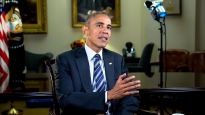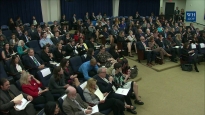Weekly Address: Holding Wall Street Accountable
April 17, 2010 | 4:51 | Public Domain
The strongest consumer protections ever. Bringing transparency to financial dealings. Closing loopholes to stop recklessness and irresponsibility. Holding Wall Street accountable and giving shareholders new power in the financial system. President Obama lays out what Wall Street Reform is about, and questions whether opposition from the Senate Republican Leader might have something to do with his recent meeting with Wall Street executives.
WEEKLY ADDRESS: President Obama Says We Must Move Forward on Wall Street Reform
WASHINGTON – In his weekly address, President Barack Obama said that in the wake of the economic crisis Wall Street reform is too important an issue for inaction. The plan moving through Congress will end bailouts, hold Wall Street accountable, and protect consumers, taxpayers and the economy from the kind of abuses that helped bring about the economic crisis. Every day without reform, those abuses, and the system which allowed them, remain in place. It is time to move forward with real reforms for Wall Street.
The audio and video will be available online at www.whitehouse.gov at 6:00 am ET, Saturday, April 17, 2010.
Remarks of President Barack Obama
As Prepared for Delivery
The White House
April 17, 2010
There were many causes of the turmoil that ripped through our economy over the past two years. But above all, this crisis was caused by failures in the financial industry. What is clear is that this crisis could have been avoided if Wall Street firms were more accountable, if financial dealings were more transparent, and if consumers and shareholders were given more information and authority to make decisions.
But that did not happen. And that’s because special interests have waged a relentless campaign to thwart even basic, common-sense rules – rules to prevent abuse and protect consumers. In fact, the financial industry and its powerful lobby have opposed modest safeguards against the kinds of reckless risks and bad practices that led to this very crisis.
The consequences of this failure of responsibility – from Wall Street to Washington – are all around us: 8 million jobs lost, trillions in savings erased, countless dreams diminished or denied. I believe we have to do everything we can to ensure that no crisis like this ever happens again. That’s why I’m fighting so hard to pass a set of Wall Street reforms and consumer protections. A plan for reform is currently moving through Congress.
Here’s what this plan would do. First, it would enact the strongest consumer financial protections ever. It would put consumers back in the driver’s seat by forcing big banks and credit card companies to provide clear, understandable information so that Americans can make financial decisions that work best for them.
Next, these reforms would bring new transparency to financial dealings. Part of what led to this crisis was firms like AIG and others making huge and risky bets – using things like derivatives – without accountability. Warren Buffett himself once described derivatives bought and sold with little oversight as “financial weapons of mass destruction.” That’s why through reform we’d help ensure that these kinds of complicated financial transactions take place on an open market. Because, ultimately, it is a marketplace that is open, free, and fair that will allow our economy to flourish.
We would also close loopholes to stop the kind of recklessness and irresponsibility we’ve seen. It’s these loopholes that allowed executives to take risks that not only endangered their companies, but also our entire economy. And we’re going to put in place new rules so that big banks and financial institutions will pay for the bad decisions they make – not taxpayers. Simply put, this means no more taxpayer bailouts. Never again will taxpayers be on the hook because a financial company is deemed “too big to fail.”
Finally, these reforms hold Wall Street accountable by giving shareholders new power in the financial system. They’ll get a say on pay: a vote on the salaries and bonuses awarded to top executives. And the SEC will ensure that shareholders have more power in corporate elections, so that investors and pension holders have a stronger voice in determining what happens with their life savings.
Now, unsurprisingly, these reforms have not exactly been welcomed by the people who profit from the status quo – as well their allies in Washington. This is probably why the special interests have spent a lot of time and money lobbying to kill or weaken the bill. Just the other day, in fact, the Leader of the Senate Republicans and the Chair of the Republican Senate campaign committee met with two dozen top Wall Street executives to talk about how to block progress on this issue.
Lo and behold, when he returned to Washington, the Senate Republican Leader came out against the common-sense reforms we’ve proposed. In doing so, he made the cynical and deceptive assertion that reform would somehow enable future bailouts – when he knows that it would do just the opposite. Every day we don’t act, the same system that led to bailouts remains in place – with the exact same loopholes and the exact same liabilities. And if we don’t change what led to the crisis, we’ll doom ourselves to repeat it. That’s the truth. Opposing reform will leave taxpayers on the hook if a crisis like this ever happens again.
So my hope is that we can put this kind of politics aside. My hope is that Democrats and Republicans can find common ground and move forward together. But this is certain: one way or another, we will move forward. This issue is too important. The costs of inaction are too great. We will hold Wall Street accountable. We will protect and empower consumers in our financial system. That’s what reform is all about. That’s what we’re fighting for. And that’s exactly what we’re going to achieve.
Thank you.
|
October 3, 2016
|
October 1, 2016
|
September 30, 2016
|
September 30, 2016
|
|
September 30, 2016
|
September 29, 2016
|
September 29, 2016
|
September 29, 2016
|
- &lsaquo previous
- …
- 18
- 19
- 20
- 21
- 22
- 23
- 24
- 25
- 26
- …
- next &rsaquo







